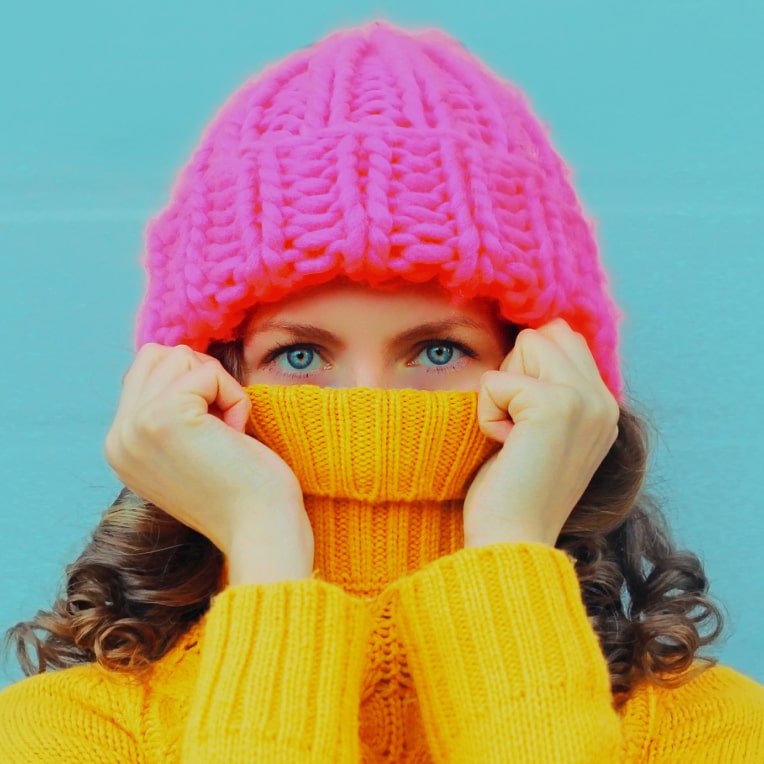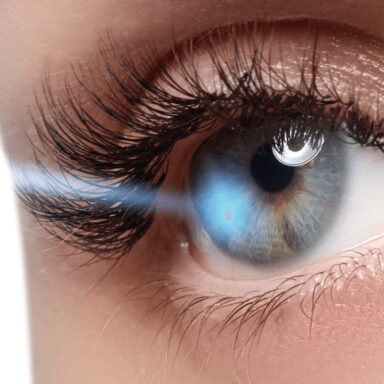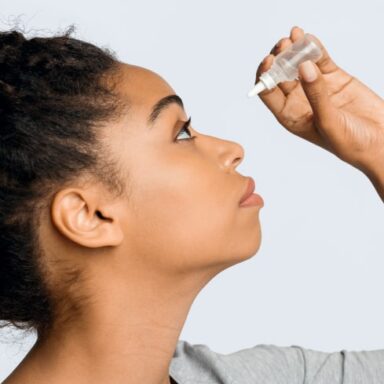We might think of winter as the wettest season thanks to gloomy clouds and driving rain, but Britain’s cooler months actually have some of the driest air. You may have noticed the effects when chapped skin leaves you reaching for balms and body oils, but you may not realise that it can also affect your eyes. For some people that can cause a subtle itchiness during especially chilly weeks, and for others, it’s downright irritating and sometimes painful day-to-day.
Is it normal to have dry eyes in winter?
Dry eyes are very common. Up to 100 million people are thought to be affected globally,1 including 1 in 4 in the UK.2 Anyone can be affected at any time, but many people are triggered by the winter environment, or find that their existing symptoms are at their worst due to the weather and a changing lifestyle.
Why do eyes become drier in winter?
The cold is the culprit here.3 Lower temperatures of air don’t hold onto water vapour as well as warmer ones, meaning moisture stays put and doesn’t evaporate so much from water sources like lakes and reservoirs.
And, there’s no escape indoors too: our central heating warms up the already dry air and any moisture often leaks outside or condenses on cold surfaces like windows – which you’ll only be too familiar with if your house is not well insulated and prone to dreaded black mould.
How can you prevent dry eye in winter?
The root cause of dry eyes in winter is dry air,4 so re-hydrating the air, re-lubricating the eye and retaining precious water in our homes and on our bodies can help avoid uncomfortable symptoms. Read on for our expert tips to help keep your eyes hydrated and, in some bonus cases, also your skin.
1. Pump up the volume (of water!)
The simple solution to dry air is to make it wetter – that’s what humidifiers do. With more moisture in the air, tears evaporate more slowly, keeping your eyes more comfortable.5 If you don’t want to invest in one of these devices, then a cheap option is to try placing some large bowls of warm water nearby to encourage evaporation.
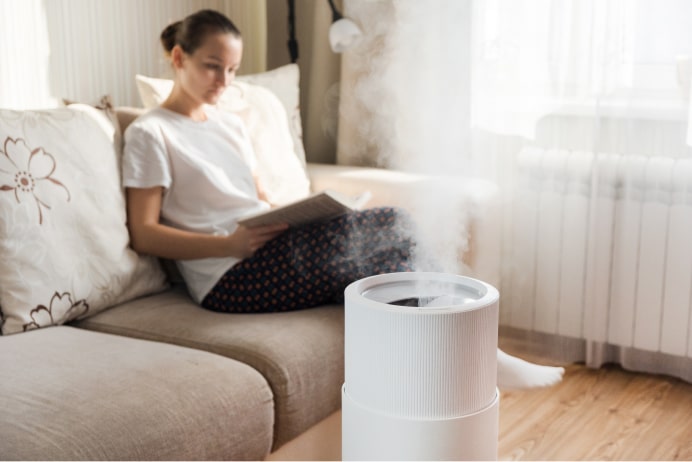
2. Stop the leaks
For some older homes, it’s not a problem of a lack of moisture, but rather a problem of moisture loss. You’ll know this if you’ve got mouldy window ledges, condensation drips, and your house or apartment struggles to retain heat. These are all tell-tale signs of poor insulation – meaning, the moisture you do have is leaking away (along with warm air). If an expensive do-over is out the question, there are some more affordable options like window film, magnetic insulation and thermal curtains that can help.
3. Put a jumper on
It turns out, that infamous grandma catchphrase is sound advice when it comes to managing dry eyes (and dry skin). It’s all about relativity – cold air and warm air want to mix: the warmer your centrally heated (and more humid) home is compared to the colder air outside, the more it will try to leak (if it can!). Lowering the temperature can help keep the moisture in and help save on heating bills. Time to bring out the blankets, hot water bottles, wool socks and cable knits!
4. … Or eye drops in
If the thought of sitting in the cold has your toes curling, then this tip is for you. Eye drops, such as the new Cationorm®, are a simple and effective way to add moisture back into your eyes, helping avoid the signs of dry eye and treat uncomfortable gritty symptoms. Put the bottle by your bedside so you can squeeze in a few drops first thing when air can be driest. Read our blog post How to apply eye drops easily to help get the most out of them.
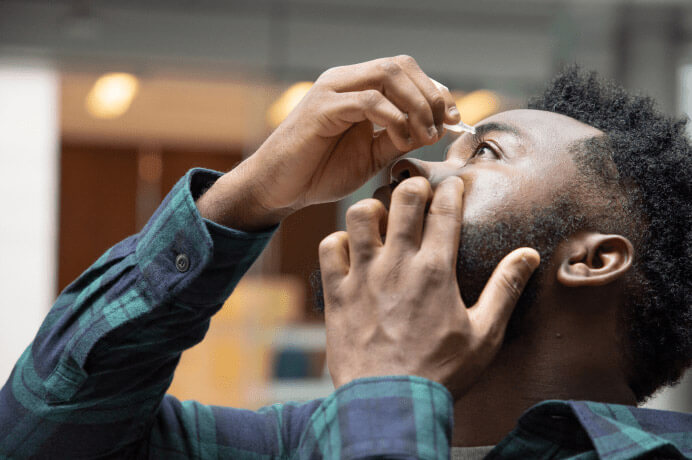
5. Dig out the sunnies
Yes, it is legitimate to wear sunglasses in winter. Here’s why: just like when you use a hairdryer, blowy air causes drying6 by encouraging evaporation, in this case of your natural tears. The friction can also irritate the eyes and lead to redness, further dryness or watery eyes – where the tear glands overcompensate. Wearing sunglasses has the bonus protection of also reducing your exposure to UV rays which can harm your eyes and raise your risk of cataracts and other eye conditions.
6. Order the fish option
A hearty chowder doesn’t just help with hunger pangs, but could also help avoid dry eye, as the omega-3s found in oily fish like mackerel and salmon are shown to have anti-inflammatory properties.7 If you’re not into fish, then you could also try flaxseeds, walnuts, or a supplement.
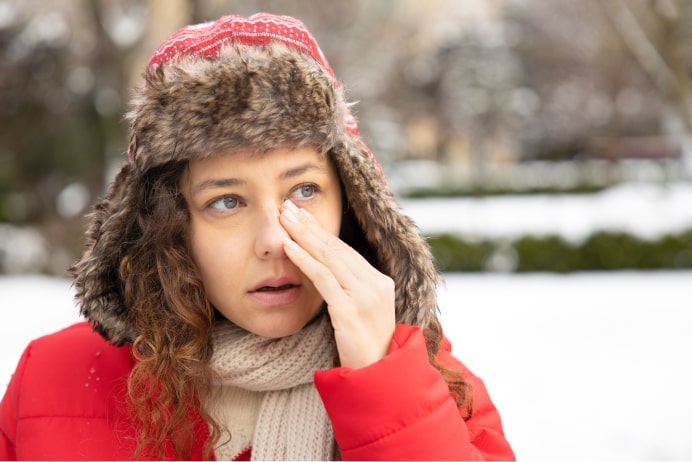
7. Take a screen break
Miserable weather means that we’re less likely to relax outside and more likely to increase our screen time, opting for TVs, smartphones and other devices to unwind and stay connected. When we use screens, our blink per minute rate is reduced by 60%. Blinking is how we rehydrate our eyes, so by not blinking as much our eyes become a lot drier. Set yourself a screen limit8 and rest your eyes with traditional indoor pastimes such as board games, cooking, yoga and meditation.
Treating dry eyes in winter
If your eyes are already feeling itchy, heavy, sandy, gritty or blurry and look red, then chances are that you’re already experiencing the irritating symptoms of dry eyes.9 You might also have times when your eye can’t stop watering with tears running down your face (even when you’re inside from the rain and wind!), and that’s a sign of dry eye too. But don’t worry there are things you can do to nip symptoms in the bud and find relief.
1. Apply a warm compress
A warm compress can feel blissful on a chilly day and can help soothe the discomfort of dry eyes.7 Simply soak a washcloth in warm water, wringing out the excess, then apply it to the affected eye for 10 – 20 minutes, or however long it takes to feel relief. For an added boost add baby shampoo which can replenish some of your eyelid’s natural oils – just be sure to wash it off afterwards.
2. Eye drops
While you can use eye drops to help prevent symptoms, just as you would with a lip balm or hand cream, they are also an effective treatment and can help provide instant relief. Cationorm® eye drops use ionic technology to attract it’s positively charged solution to the negatively charged surface of the eye, locking in hydration for longer. Its deep-acting clinically proven formula targets all three layers of the eye:
- Restoring outer protection
- Rehydrating and rebalancing the water-based layer
- Supporting inner healing
3. Rest
Get plenty of sleep, and take a break from screens,8 potentially irritating eye make-up, alcohol and other activities which could cause eye strain.
While most dry eyes are mild, in more severe cases it can cause permanent damage to the surface of the eye.10 That’s why it’s important to treat symptoms early to prevent any vision loss. If, with lifestyle changes and treatment, your symptoms aren’t getting better, then you should speak to your ophthalmologist, pharmacist, optician or GP.


